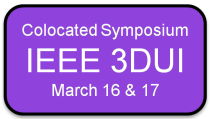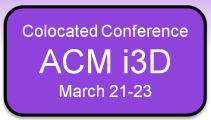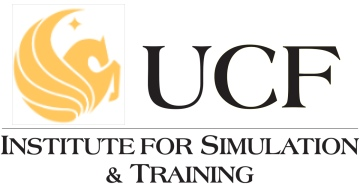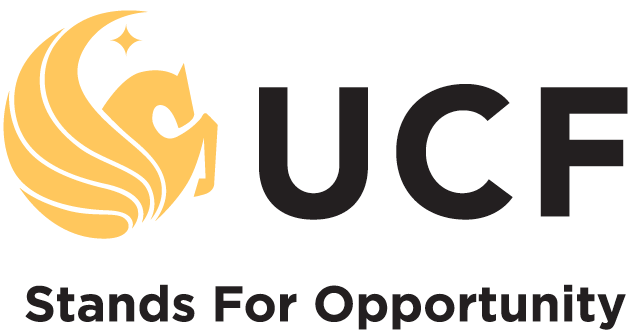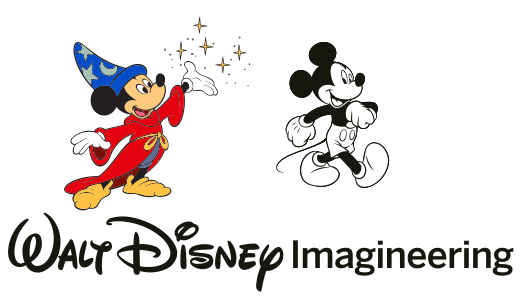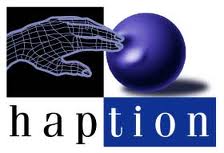- Home
- Program
- Presenter Info
- Call for Participation
- Venue
- Registration
- Committees
- Past Conferences
- IEEE 3DUI 2013
- ACM i3D 2013
Workshops
[WS-001] Workshop on Off-The-Shelf Virtual RealityThe Workshop on Off-The-Shelf Virtual Reality is intended to bring together researchers, professionals, and hobbyists to share ideas that leverage off-the-shelf technology for the creation of virtual reality experiences. Building on a successful workshop from IEEE VR 2012, OTSVR 2013 will provide a venue for sharing novel hardware prototypes, software toolkits, interaction techniques, and novel immersive systems and applications that integrate low-cost consumer and hobbyist devices. With an eye towards penetrating the barrier for widespread use, the workshop will focus specifically on research and applications using technology that is replicable at the price point of a typical home user. Specific areas of interest include, but are not limited to:
Date: Saturday, March 16, 2013 Website: Organizers: Evan Suma (USC Institute for Creative Technologies) David Krum (USC Institute for Creative Technologies) Marc Bolas (USC School of Cinematic Arts) Contact: otsvr2013 [at] easychair.org Submission Deadline: Sunday, February 17, 2013 |
[WS-002] 6th Workshop on Software Engineering and Architectures for Realtime Interactive Systems (SEARIS) 2013SEARIS provides a forum for researchers and practitioners working on the design, development, and support of realtime interactive systems (RIS). These systems span from Virtual Reality (VR), Augmented Reality (AR), and Mixed Reality (MR) environments to novel Human-Computer Interaction systems (such as multimodal or multitouch architectures) and entertainment applications in general. Their common principle is a strong user centric orientation which requires real-time processing of simulation aspects as well as input/output events according to perceptual constraints. Therefore, we encourage researchers and developers of real-time human computer interaction systems of all flavors to share their experiences and learn from each other during this workshop. The upcoming workshop will again feature Personally Inspiring Publications as an interesting new form of contribution, see next section for details. SEARIS wants to account the state-of-the-art in software design and software engineering for realtime interactive systems, to shape a common understanding, to compare systems and approaches and derive common paradigms, to develop useful and necessary methods and techniques, and to foster new ideas. Topics of interest include (but are not limited to):
Date: Sunday, March 17, 2013 Organizers: Marc Erich Latoschik, Julius Maximilian University of Würzburg, Germany Dirk Reiners, University of Louisiana, Lafayette, USA Roland Blach, Fraunhofer IAO, Stuttgart, Germany Pablo Figueroa, Universidad de los Andes Bogota, Colombia Chadwick A. Wingrave, University of Central Florida, USA Contact: searis [at] isg.cs.uni-magdeburg.de Submission Deadline: Friday, January 18, 2013 |
[WS-003] Workshop on Immersive Volumetric Interaction (WIVI 2013)There is a growing interest in interaction research of volumes for immersive virtual environments and immersive visualizations. Traditional interaction modalities may not be sufficient to select and manipulate multiple objects or data points or have the potential to interfere with users’ sense of immersion or workflow. Additionally, there is a strong interest in scaling interfaces from the desktop display to higher immersive display systems, therefore cost, availability, and familiarity all play a role in designing interaction. Solutions tend to be focused on separately in these communities, however we propose a common forum to openly discuss these issues and ideas for solutions. The IEEE VR 2013 Workshop on Immersive Volumetric Interaction is intended to bring together researchers, developers, and users from multiple communities in Virtual Environments, 3D User Interfaces, and Immersive Visualizations to discuss issues and share ideas that relate to the process, interaction modalities, hardware, software, interface constraints, and users’ goals and workflow as they relate to the problem of interacting with volumetric data in immersive visualizations and/or multiple objects defined as a volume in virtual environments. This workshop will provide a forum for presentations and energized discussions to initial new and exciting developments in this area as well as connections for collaborations among multiple research disciplines. Date: Saturday, March 16, 2013 Organizers: Amy Banic (University of Wyoming) Patrick O’Leary (Kitware, Inc.) Zachary Wartell (University of North Carolina at Charlotte) Contact: wivi2013organizers [at] googlegroups.com Submission Deadline: Sunday, January 6, 2013 |
[WS-004] The Second International Workshop on Ambient Information Technologies (AMBIT 2013)In VR environments, users are surrounded by various kinds of devices such as sensors, displays, actuators, etc. Integration with these devices and analysis of the acquired data can lead to new techniques and technologies that offer users various comfortable computer-supported environments. Ambient information technologies have attempted to allow users to unconsciously access useful information with various kinds of displays according to the users’ situation, which is acquired by the sensors. Following the success of the first event in 2012, the second workshop on Ambient Information Technologies (AMBIT 2013) is aimed at bringing together researchers who develop devices (sensors, displays, actuators, etc.) used in VR environments or applications that utilize these cultivated devices and integrate the acquired data with information to be displayed. The workshop will begin with an introduction, then the invited speakers will report their latest findings related to ambient information technologies. The following sessions will address specific areas where we will review the state-of-the-art and discuss current issues and future research directions. We hope that this workshop will give helpful hints for the design, operation and applications of ambient information environments with VR technologies. Specific topics of interest include, but are not limited to:
Date: Sunday, March 17, 2013 Organizers: Yuichi Itoh (Osaka University, Japan) Kiyoshi Kiyokawa (Osaka University, Japan) Tatsuhiro Tsuchiya (Osaka University, Japan) Naoki Wakamiya (Osaka University, Japan) Hiroyuki Ohsaki (Osaka University, Japan) Evan Suma (USC Institute for Creative Technologies, USA) Satoshi Kurihara (Osaka University, Japan) Naoki Wakamiya (Osaka University, Japan) Contact: ambit2013@hi-mail.ise.eng.osaka-u.ac.jp Submission Deadline: Sunday, February 10, 2013 |
[WS-005] Workshop on Virtual and Augmented Assistive TechnologyThe IEEE VR 2013 Workshop on Virtual and Augmented Assistive Technology is intended to bring together technological and clinical research communities to advance the state-of-the-art in Virtual Reality (VR) and Augmented Reality (AR) assistive technology. Over the past several decades, there has been a host of research conducted to improve rehabilitation and enable assistive technology for persons with disabilities (e.g., cognitive, physical) through VR and AR. However, this area needs to take more advantage of state-of-the-art VR and AR technology.. We believe this situation could be improved if the two contributing communities to this area – the technology and the clinical communities – had greater opportunity for more direct interaction and collaboration to advance the field. This is the primary goal of this workshop. Specifically, we are inviting submissions of position papers and preliminary research that focus on
Date: Sunday, March 17, 2013 Website: Organizers: John Quarles (University of Texas at San Antonio) Victoria Interrante (University of Minnesota) Belinda Lange (Institute for Creative Technologies) Contact: vaat2013 [at] easychair.org Submission Deadline: Saturday, February 16, 2013 |



